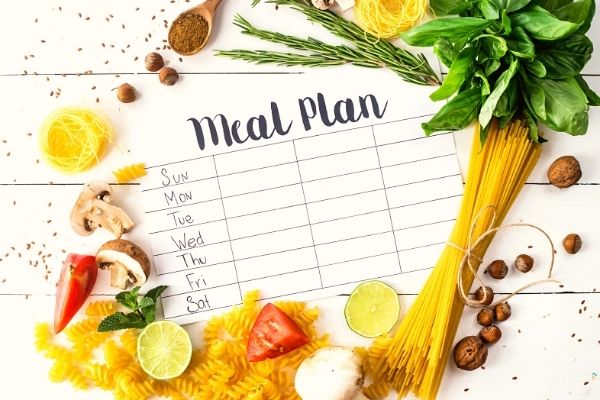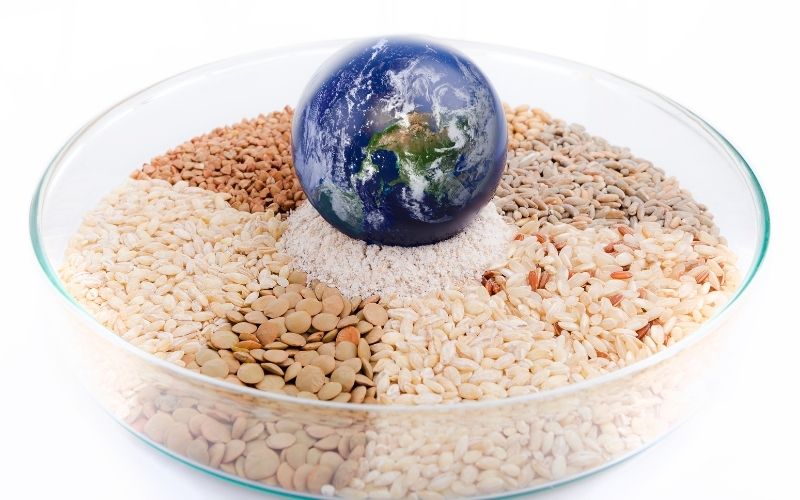What happens roughly 24 billion times per day on Earth? Humans having a meal. About a third of all of the resources we extract or use from the planet are funneled toward our insatiable appetites. If we are to continue living together on this planet for a little longer, we have to smarten up and adopt some more eco-friendly eating habits. Especially those of us with privilege who enjoy access to an abundance of food options.
When tackling our food’s environmental footprint, it’s easy to get distracted by small issues on the way to making big changes. Let’s focus on some low hanging fruit with a big impact instead. In this post, I suggest five eco-friendly eating habits you can adopt today to be part of the solution.

Number 1 among my eco-friendly eating habits: meal planning
About 40% of the food we produce is fed to garbage trucks. Think of all the wasted land, fertilizer, labor, energy, and more! Meal planning isn’t the most exciting green trend, but it may be the most important eco-friendly habit to adopt right now. In addition to increasing your odds of buying your kale and eating it too, meal planning will decrease your reliance on not-so-healthy take-out dishes and wasteful meal kits.
Make a change, grab pen and paper: Download a printable meal plan template and write down what you’ll eat next week, then create your shopping list. Hate making decisions? Try my free all-in-one plant-based meal plan, or sign up for my Vegan Meal Plans. Remember to adapt your meal plan to your life’s commitments so you don’t end up buying ingredients for meals you can’t possibly find the time to cook.

At home, drink tap water
The global market for non-alcoholic beverages is approaching about 1.5 trillion dollars (that’s $1,500,000,000,000) and guess what the vast majority of those drinks are served in: disposable containers. Although technically many of those containers are recyclable, the reality is that many (most?) aren’t, and even if they are the recycling process also requires energy and resources.
And for what? Mostly soft drinks that are filled with empty calories and harmful additives. As consumers become more aware of the sugar content of soft drinks, they increasingly spend their food and drink budget on so-called “non-nutritious” beverages without calories, which means basically water with bubbles and flavor added. Considering the amount of waste involved at all stages of those beverages’ life cycle, is it really worth it?
Make a change, turn on the tap: If, like the majority of my readers, you have the good luck of living in a home served by adequate municipal water systems, please just fill a couple of big bottles or pitchers with plain tap water and refrigerate them. In only a few hours, any chlorine smell will have dissipated and you’ll have a delicious drink to enjoy. Add a slice of lemon or lime for extra zing if you like, even stir in a teaspoon of sugar if that’s important to you. If your building has old pipes, just let the water run for a few minutes in the morning to clear accumulated residue. If your city’s water tastes funny, a little research will yield a filtering solution you can adopt. Whatever you do, drinking tap water will be drastically less wasteful than buying bottled beverages to drink at home. (Bonus: your grocery bags will be lighter and you’ll save money too.)

Not ready to go vegan? Up your flexitarian game
Many people choose chicken over beef, thinking it is part of eco-friendly eating habits. Unfortunately, and although so-called “white meat” is associated with fewer greenhouse gas emissions than “red meat,” those millions of chickens raised in mega-sheds are making a mega-mess. What’s more, intensive poultry production sites tend to be located in or near low-income racialized communities who are over-impacted by the water and air pollution from manure storage and applications, and less empowered to fight back.
I often hear from flexitarians who only buy chicken from Paradise Farm down the country lane, where chickens supposedly roam free and experience only one bad day in their life: their last. Do they also enquire about the provenance of meat when they eat out, help themselves from the buffet at catered events, or get an in-flight meal? Those are even more likely to be sourced from industrial suppliers with dubious practices, because they are most able to cut down the costs.
Make a change, set boundaries: From a planetary standpoint, flexitarianism is only beneficial if it leads to a significant reduction in the consumption of animal products. Obviously, most of humanity will continue eating lots of meat, so can you take one for the team and attempt a 80% reduction relative to your baseline? If you decide that being flexitarian is what is right for you right now, take a moment to decide under what circumstances you will eat animal products, as opposed to when you will make every effort to eat plants instead. Having a pre-established game plan, as opposed to just wishing to eat less meat and winging it on a meal-to-meal basis, will ensure you truly make a dent in your diet’s carbon emissions and decrease the demand for polluting foods.

Take the time to cook
The food industry’s drivers for the past 100 years have been convenience and cost: how can more food be delivered to more people faster and cheaper? There are undeniably positive innovations that many of us enjoy as a result (quinoa! bananas in Canada’s winter!), but, in general, our mindless pursuit of faster and cheaper meals has not been good for our bodies or for the planet.
If you are too busy to cook a simple meal, let’s say soup, from scratch for yourself and your loved ones, it might be time to seriously examine your lifestyle and priorities. Yes, there are millions of North Americans who have to juggle multiple jobs to make ends meet, and suffer from not having a stable place with a kitchen to call home. But there are millions of others who, perhaps unconsciously, have slipped into an incessantly busy lifestyle that leads them to eating sub-standard processed food on the go all the time.
Make a change, slow down, and cook something: Ask yourself if all those activities and commitments are more important than your physical and mental health. Would slowing down and taking the time to cook decrease your footprint, not just by reducing the amount of processed and overpackaged food you eat, but by enhancing your awareness of what you consume?

Write to elected representatives weekly
Adopting one of those eco-friendly eating habits is a great place to start, but an unfortunate place to stop. Our global food system is regulated by local, regional, national, and international rules and treaties, and putting pressure on our elected leaders to pay attention to environmental issues is essential. Depending on where you live, different levels of government will have jurisdiction over different issues. You may want to connect with local advocacy organizations to learn more about existing campaigns and hop on, but make sure to send personalized letters, handwritten ones if possible, for maximum impact. Individual communication is more effective than signatures on a petition (although of course those are also a good idea).
Make a change, voice your concerns: Make a list of environmental and other issues you care about, and identify pertinent local elected representatives for each one. Set time aside each week when you’ll sit down and write a formal letter explaining what you want your elected representative to know and do (good tips here). Mail your letter! For extra punch, encourage friends and family to do the same.
What eco-friendly eating habit will you embrace today?
Share your next move in the comments.





It is hard to change bad habits but just starting with one is a good plan. Thanks for all the good ideas.
Thank you for your efforts Gary!
Thank you for providing such an informative resource! I
personally believe that consuming a whole-foods, plant-based diet is the
way to go in terms of eco-friendly eating! But that doesn’t mean that it is necessary to cut out highly
processed foods completely… Balance is the key, after all 🙂
Unlike the negative health implications ultra-processed foods are known
to have, their environmental impact is less well-known. If you’re
interested, you can read more about their implications for planetary
health here: [https://ecoworlder.com/ultra-processed-foods-environment/](https://ecoworlder.com/ultra-processed-foods-environment/)
Keep up the great work!